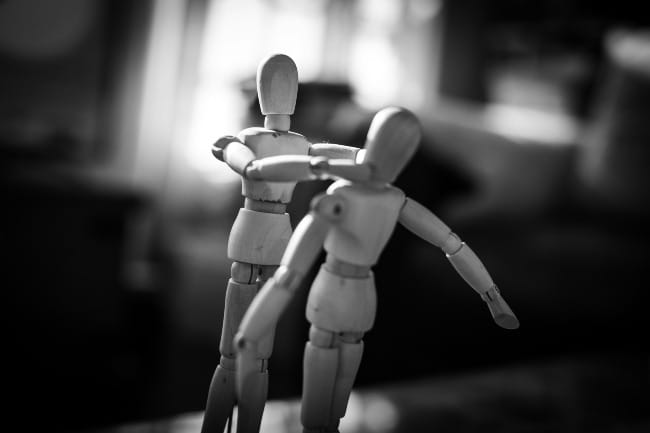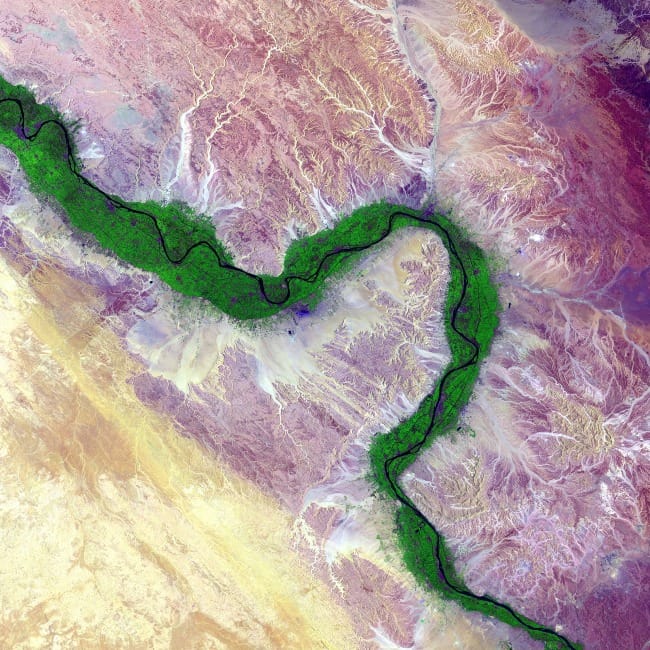If you want to take a few minutes to read the second chapter of Exodus, click HERE. And if you missed the first column in this series, click HERE.
Exodus 1 ends with Pharaoh's horrific and paranoid command that every Hebrew baby boy should be thrown into the Nile. One might think that such cruelty would work - what Hebrew would want to bring a baby into such a messed-up, violent world (something we often hear today)? Yet the pull towards life is strong; right after the edict is given, we are told of a new marriage and the birth of a son - creation continues.
Though God has not yet been formally introduced in Exodus, we continue to see divine fingerprints in the story. We are told that the mother looks at her son and sees that he is "a fine baby." The Hebrew word used here is "tov" - the same word used in Genesis 1 when God looks upon creation. A better translation might be, "When she looked upon her son, she saw that he was very good." This fragile little life is connected to the goodness of the primal creation, and is also a part of what God is doing to renew what has gone wrong with the world.
The mother hides him until she can no longer protect him. She forms a risky plan, spreading pitch and tar across the bottom of a basket to create a floating haven for her child. The same word translated "basket" is used in Genesis for the great ark. Once again, we have life floating precipitously upon the waters of death (see Gen 6:14).
This little "ark" is placed in the waters among the reeds, out of the hands and control of the mother. But the baby's sister stays close, and watches as Pharaoh's daughter comes down to the Nile to bathe. The princess sees the basket and discovers the baby. She knows it is a Hebrew boy. She is in a position to follow her father's command...yet she does not. She is moved by her discovery and filled with compassion. The sister quickly offers to find a nursemaid, and before long mother and child are reunited. Once again, death has been thwarted in a subversive twist that undermines the power of Pharaoh.
The boy grows up and is adopted by Pharaoh's daughter; he is now a prince of Egypt named Moses. Through the ingenuity of his mother and sister, and the disobedience of Pharaoh's daughter, he is safely hidden - for now - within the very court of the king who wished him dead.

"One day after Moses had grown up, he went out to his people and saw their forced labor." Having left the safety of the royal palace, Moses sees the dark side of the Egyptian empire. When he comes across an Egyptian beating a Hebrew, he comes to the slave's aid and kills the overlord. We now see that despite his Egyptian upbringing, Moses' Hebrew heart beats strongest. Despite his effort to conceal the crime, word of the deed spreads all the way to the ears of Pharaoh. Once again, Moses' life is in danger.
Moses flees to the land of Midian, a sparsely populated region east of Egypt. Wilderness areas like Midian are frequently places of testing and transformation in the Bible - and this is certainly true of Moses. At a well, he comes to the defense of some women who need to water their flock but are driven away by some shepherds - another example of Moses' concern for the vulnerable and oppressed. He ends up marrying one of the women and settling down. When his first son arrives, he names him Gershom, which resembles the Hebrew word for alien or foreigner. The name testifies to Moses' self-realization: “I have been an alien residing in a foreign land.”
This chapter is full of action and insight - here are three themes we might reflect on as ecological disciples.

The Centrality of Water
The Nile was the lifeblood of ancient Egypt and plays a central role in this and subsequent episodes. In this chapter, Pharaoh orders his people to use the Nile as a tool of death; Moses' mother uses it to extend her baby's life; Pharaoh's daughter comes into the story as she uses the water to bathe. Water kills, and saves, and cleanses - no wonder Christians have found such immense power and meaning in baptism!
Any symbolic understanding of water - like baptism - is rooted in real dependence on water, and should lead us to reflect on how we interact with the water sources that make our lives possible. Do we know our watersheds and work to protect them? Our use of the earth - specifically in the burning of fossil fuels - has magnified water's destructive power. A warming planet has led to melting glaciers, rising seas, and intensifying storms - we are literally drowning coastal communities, many of which are full of vulnerable people.

Resistance to Empire
Moses is saved because of the compassion and courage of women who resist Pharaoh's law. His mother and sister resist despite their powerlessness; Pharoah's daughter resists from within the very center of Egyptian power. No matter what our social standing might be, there are actions we can take to resist the oppressive forces that threaten vulnerable people and places.
I find it interesting to note how central women are to this story. In my work with Circlewood, I have noticed that women, in general, are more concerned with the health of the planet than men, and are more likely to be taking active steps to care for people and places in intentional ways. I do not have the data at hand to confirm this observation, but it has made me more aware of the leadership roles that women are taking in the work of resistance and the journey toward a more peaceful, sustainable future. I encourage you to listen to an upcoming Earthkeepers podcast that features Nina Simons, co-founder of the Bioneers organization and author of the newly released Moonrise: The Power of Women Leading from the Heart."

The Transformational Journey
As Exodus 2 speeds quickly from Moses' birth to young adulthood, we can see the beginning of the personal transformation he will undergo. Though it seems he is naturally predisposed to act on behalf of the vulnerable (Did he learn this from his mother and sister? Pharaoh's daughter? Both?), he clearly experiences a transformative awakening when he observes the cruelty of the empire firsthand.
It is still possible for some to live in ignorance regarding the suffering of Earth and our planet's vulnerable creatures (which of course includes vulnerable humans). Nuclear waste sites, for example, are often far from population centers, placed in poor, rural communities that lack the political power to oppose them. Climate change is impacting impoverished communities in increasingly destructive ways, yet still appears to many as an abstract issue. The fact that we are causing the Sixth Great Extinction can sound like the plot of an action movie, rather than a real threat to over one million species.
We can learn from the choice Moses makes to expose himself to harsh realities that have been carefully concealed from him. This journey of awakening can be painful. Moses reacts to what he sees with violence, which may be justified, but may also be a sign that he must unlearn the ways of Egypt before he can truly act for change. Moses is also forced to flee what has been his homeland, becoming an exile alone in the wilderness. For us, awakening to a planet in peril can be heartbreaking. The great conservationist Aldo Leopold wrote, "One of the penalties of an ecological education is that one lives alone in a world of wounds."
If grief is one of the penalties, one of the rewards is the opportunity to be transformed. As Moses physically moves from Egypt to Midian, he sheds more and more of his Egyptian identity, acknowledging that he has been "an alien residing in a foreign land." He is adrift, which also means he is open to new possibilities. I believe that living in this liminal place - physically, socially, and spiritually - is essential for Moses to be ready for the encounter that changes everything.
That will be the focus on our next Exodus exploration. For now, I encourage you to take a moment and remember moments of awakening and resistance in your life. Who are the exemplars of resistance you look up to? When have you "woken up" to the suffering around you? What acts of resistance have you taken? Where might God be leading you?
Feel free to share your thoughts on these questions, or anything else that has touched your mind or heart, by leaving a comment below or emailing me directly at james.amadon@circlewood.online
With you on the Way,
James
Like what you are reading? Consider joining our supporter community, The Circlewood Stand.